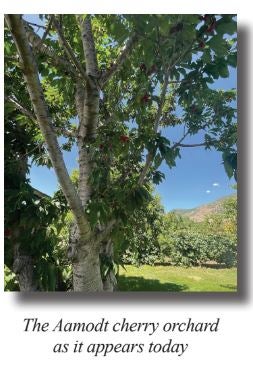What motivates Bob Aamodt in his financial advising career wasn’t born in a university classroom or in a fast-paced corporate office. Much of it came from his family’s fruit orchard in Farmington, Utah. It was there, as a 12-year-old boy, that his natural drive and tenacity would be cultivated as he picked cherries for the family to sell to local fruit suppliers. “My great-grandfather, David L. Rice, planted the very first sweet cherry trees in the state of Utah around the turn of the century in Farmington,” explains Bob, “and I love the fact that my own experiences in our cherry orchard as a kid are somewhat tied to him.”

But the important lessons he learned began a few years before he ever climbed a ladder or filled a bucket with fruit. When Bob was around nine or ten, his mom marched her kids down to the old Davis County Bank on Main Street in Farmington and announced that they would be opening a savings account. . Putting savings into that account every month helped him see, early on, the significance of setting financial goals and reaching them. It was about that time that his parents, Dave and Shirley Aamodt, hatched the family cherry venture and Bob had the opportunity to learn more lessons about the merit of hard work and commitment and how that affected the achievement of those financial dreams.
Cherry picking at the Aamodt orchard began in June, as soon as the fruit was ripe. Bob and his younger brother, Dan, picked as long as the cherries lasted, generally through the blazing month of July. “We would get up early and pick for hours,” he recalls. “Some days we were diligent and others not so much — but we still worked.”
That work was tedious, hot, and grueling. Bob’s parents expected that the boys pick the cherries with the stem on. “We didn’t like this policy,” Bob quips, “because it was far quicker to just pull them off the stem.” But they learned that the stems were an important sign to the final purchaser as to the freshness of their product. “This extra step helped me appreciate the importance of doing my absolute best, even when that was inconvenient for me,” notes Bob.

After a few years, the Aamodts were able to expand their workforce to include some of the neighborhood children. Once Bob was a bit older, his mom turned over to him the weighing, tracking, and paying of wages to the other pickers, where he says he was able to more fully cultivate the management skills he later used as the leader of his financial advisory firm, Rock House Financial, that has roots back to 1998.
Bob estimates that each summer the family picked and sold close to 2,000 pounds of cherries. Each kid would keep track of how many pounds they had picked on a tally sheet, adding to the tally with each bucket weighed. They were paid 10 cents a pound, which meant they earned between $2 and $3 per hour and a total of $20 on a really good day. By the end of the cherry season, Bob would have about $100 — which he then tithed — leaving $90 left to spend.
“I was taught young the importance of giving back by paying tithing,” says Bob. “Giving away a part of all you earn to your church, favorite charity, or other organizations devoted to causes that you support, can be a great blessing,” notes Bob, explaining that over the years he’s learned that tithing curbs the natural desire to keep a tight grip on your money and ironically seems to attract more abundance into your life. “It’s a hard principle to understand until you actually live it,” he says, “but tithing has always been a great benefit to me and my family.”
Once all the picking was complete, the Aamodts sold their cherries for between 35 and 75 cents per pound, depending on the year. They would then pay the pickers and cover overhead. The Aamodt boys were expected to put their share of the remaining profits in savings.
“During cherry season, it was all about cherries,” says Bob. “For two to three weeks we did little of anything else. It was hot, tiring work and any neighbor kid not involved in the picking would often taunt us a bit with their talk of going swimming.” Bob recalls one year, on a hot July day — when the cherries were finally played out — riding his bike down to the old Lagoon swimming pool, a common haunt for all the Farmington kids. Exhausted from the previous weeks of picking fruit, he waded into the cool water at the shallow end and looked up at the clouds, commiserating the difficulties, while celebrating the joy, of a job well done. “I remember having such a feeling of satisfaction, in that moment, something I had never felt before in my life. That feeling of doing my best has stuck with me ever since and continues to motivate many of my endeavors.”

Looking back on the cherry venture, Bob says he learned some powerful life lessons about the value of money, the gift of work, and sticking with something until it’s done. Those lessons have had a huge impact on him and now influence his work as a CERTIFIED FINANCIAL PLANNER™. “The cherry orchard taught me that if you want something from life, you need to plan, cultivate, and work for the reward.” This principle, learned young, is something he’s passionate about sharing now with the clients he loves to serve.
Rock House Financial (RH Advisors) throughout this website has provided links to various other websites. While the firm believes this information to be reasonably reliable, current and valuable to its clients, The firm provides these links on a strictly informational basis only and cannot be held liable for the accuracy, time sensitive nature, or viability of any information shown on these sites.
The opinions expressed herein are those of the firm and are subject to change without notice. The opinions referenced are as of the date of publication and are subject to change due to changes in the market or economic conditions and may not necessarily come to pass. Any opinions, projections, or forward-looking statements expressed herein are solely those of author, may differ from the views or opinions expressed by other areas of the firm, and are only for general informational purposes as of the date indicated.











